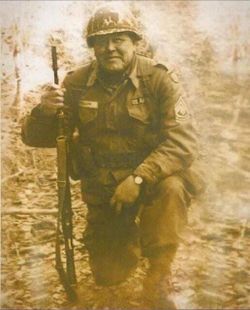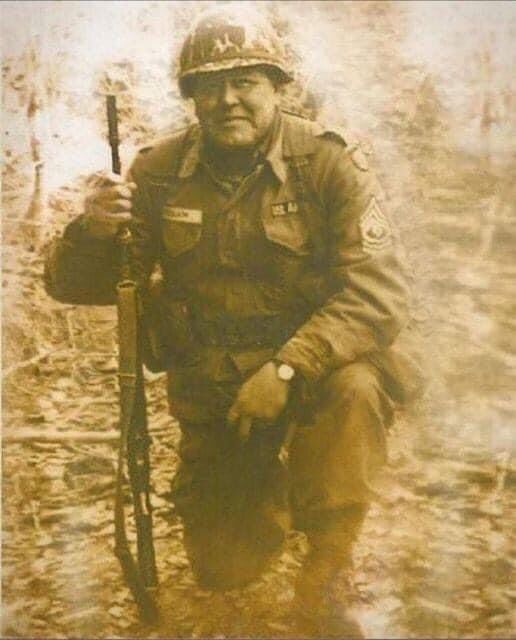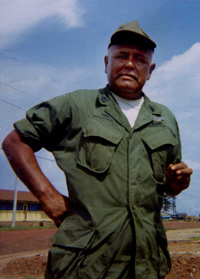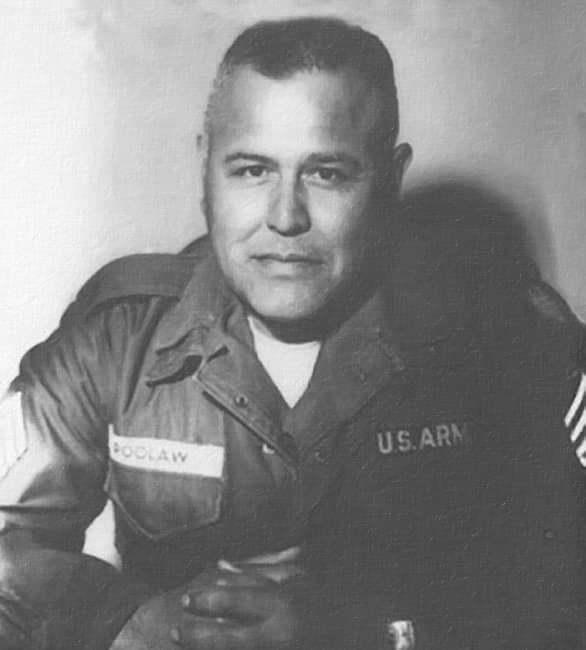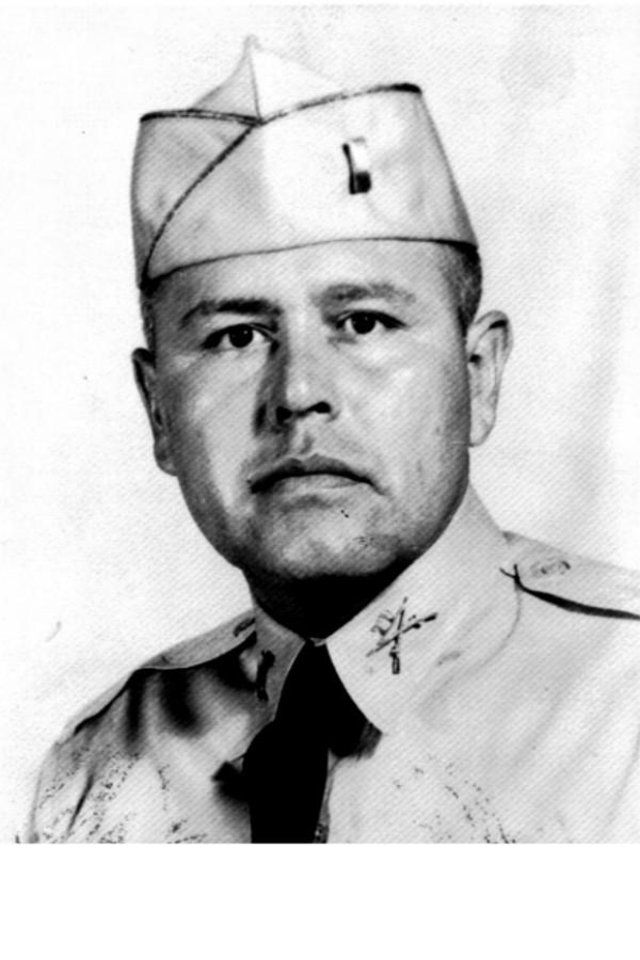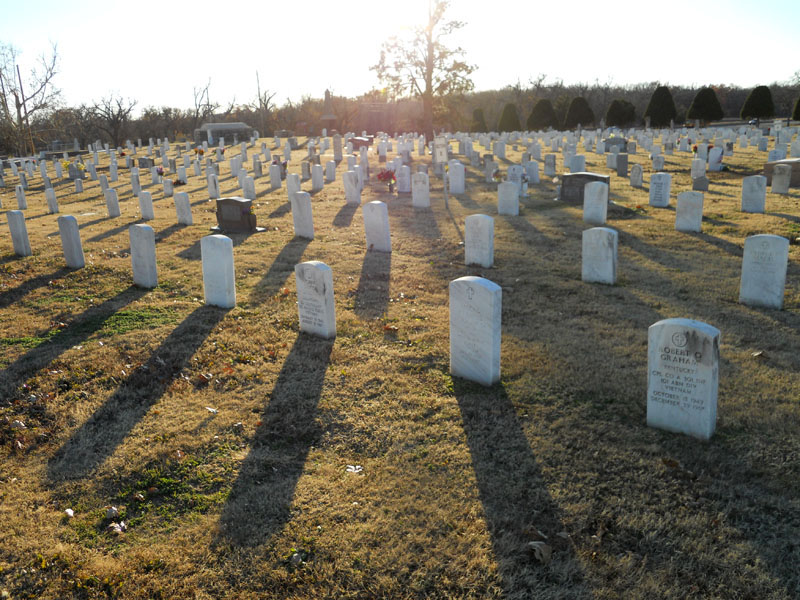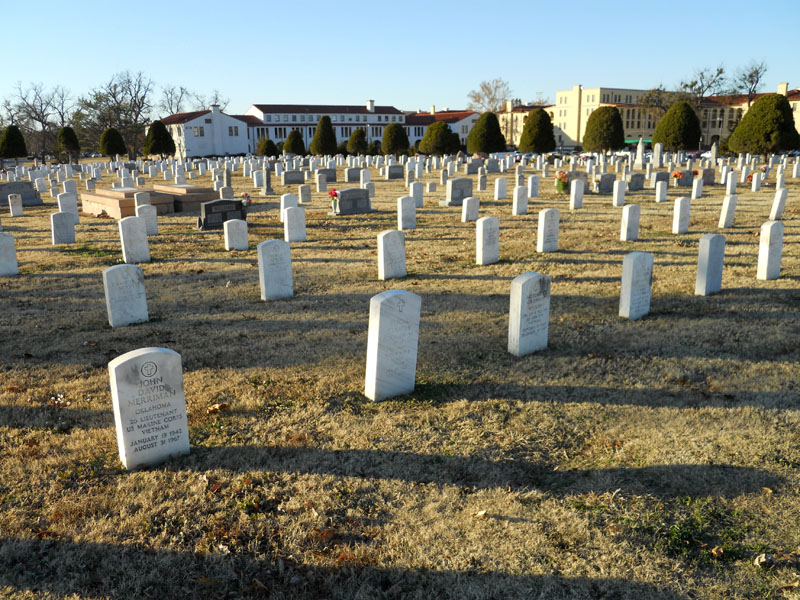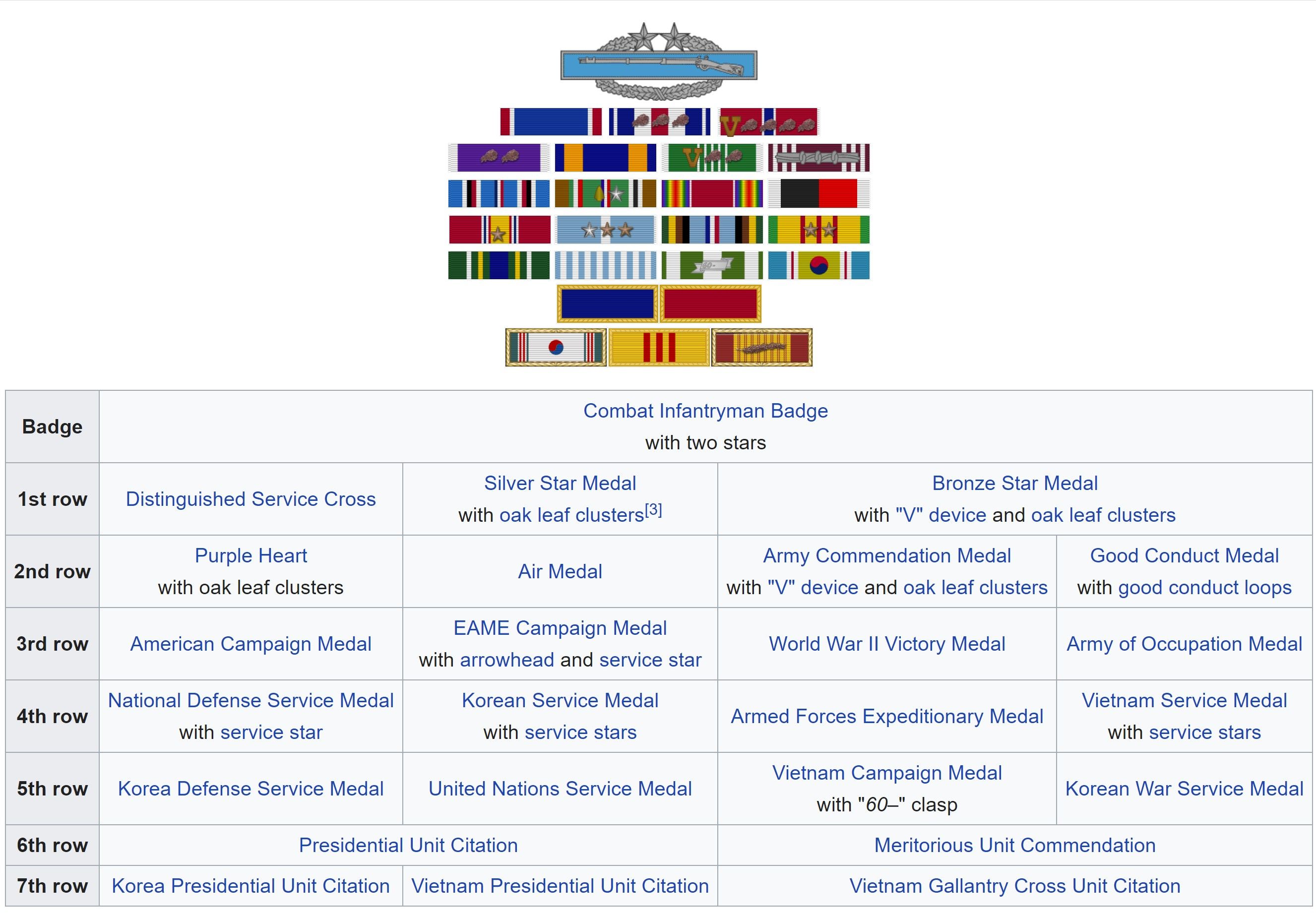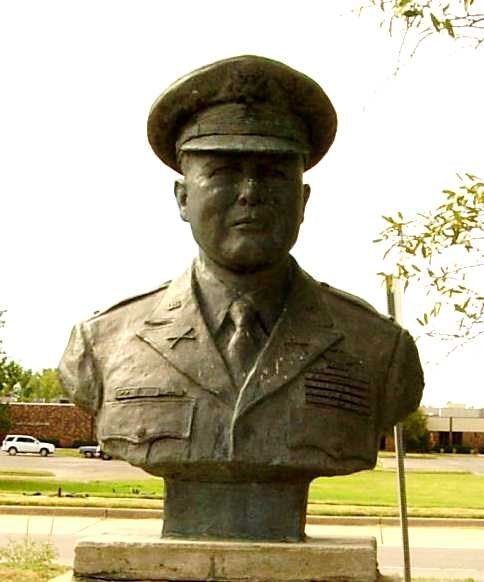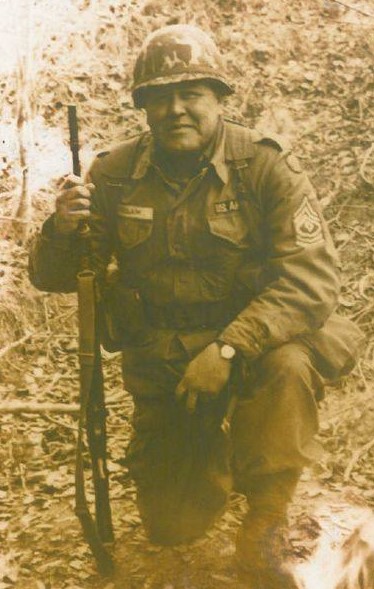The fourth Silver Star was awarded posthumously after Poolaw died during action in Vietnam. On Nov. 7, 1967, Poolaw's unit, Company C, 1st Battalion, 26th Infantry, was part of a search and destroy mission near the village of Loc Ninh.
The unit was attacked by numerically superior Viet Cong force. Under a hail of fire, Poolaw raced to the lead squad, exposed all the way, and deployed the squad there to lay down a base of fire, the citation read. This action saved countless lives, but Poolaw wasn't finished.
Poolaw continued moving among the troops, making sure they were positioned properly pulling casualties back to the lines despite being wounded himself. He was mortally wounded as he pulled another casualty back to the lines.
His devotion to his soldiers was exceeded only by the love of his family. Poolaw served in Vietnam trying to spare his son the horrors of war.
When his son, Lindy, received orders for Vietnam, Poolaw volunteered for the combat zone with he hope of serving there in place of his son. Regulations prohibit two members of the same family from serving in combat at the same time without their consent.
Another of Poolaw's sons had already been in Vietnam which added to his wanting to spare Lindy. His son, Pascal Cleatus Poolaw, Jr., a Specialist 4, had been wounded in Vietnam in February 1967. The younger Poolaw was hit by a mine and received metal fragments in the legs. His right leg had to be amputated below the knee.
When the senior Poolaw finally reached the port of departure on the West Coast, he discovered Lindy had left for Vietnam the day before. He decided to follow his son.
Having the father and son of the family serving in combat at the same time was nothing new to Poolaw. He had served in World War II with his dad, Ralph Poolaw Sr., and his two brothers.
Poolaw served almost four months in Vietnam before the fatal combat operation. In a letter he wrote just before his death, Poolaw said he rated his job as being more important than his life.
In her eulogy at Poolaw's funeral at the Fort Sill Post Cemetery, his wife, Irene, echoed those sentiments. "He has followed the trail of the great chiefs," she said. "His people hold him in honor and highest esteem. He has given his life for the people and the country he loved so much."
The example of Poolaw's bravery and devotion lives at Fort Sill, where he served for a year before going to Vietnam. Poolaw Hall at Sheridan Road was named after him and contains an exhibit dedicated to the American Indian soldier.
http://www.army.mil/american
Pascal Cleatus Poolaw Sr.
A Hero on The Vietnam War Memorial
A full-blooded Kiowa from Anadarko, Sgt. 1st Class Pascal Cleatus Poolaw, who
served during three wars, was killed in Vietnam in 1967. He was 45.
A total of 42 awards and medals, including four Silver Stars, five Bonze Stars, one
Air Medal and three Purple Hearts, makes Poolaw the most decorated Indian
soldier in U.S. history.
Poolaw attended Riverside Indian School and married classmate, Irene Chalepah a
beautiful and good Apache woman. He joined the U.S. Army on August 27, 1942.
He rose through the ranks to earn a battlefield commission as a second
lieutenant, but later relinquished his commission.
While in service to his country, Poolaw was wounded in Germany in September
1944 and in Korea on April 4, 1951.
He earned a Purple Heart with an Oak Leaf Cluster, a Bronze Star with Oak Leaf
Clusters and a Silver Star with two Oak Leaf Clusters. He was awarded the Silver
Star when he was with the 8th Infantry in Belgium September 8, 1944. His citation
to the third Bronze Oak Leaf Cluster to the Bronze Star was awarded for his
service in the Korean War during 1950-51. He received his Silver Star in Korea
April 4, 1951.
Serving in a long line of military men, Poolaw served in World War II during the
time his father, Ralph Poolaw Sr., and his two brothers were also serving. His
grandfather, "Kiowa George" Poolaw served as a member of the famed all Indian
Cavalry Troop 1 at Fort Sill from 1893-95.
He served a year at Fort Sill before volunteering for duty in Vietnam. He had just
completed his 25th year of service when he was killed in action while rescuing his
wounded men under fire.
http://www.americanindianexposition.org/TewanaranjoatVNWM.doc.pdf
I linked the Lindy Poolaw to his parents with additional information today. At the time of his father's death in Vietnam, sibling PVT Donald R Poolaw was serving with Company D, 2nd Battalion, 1st Brigade, Ft Leonard Wood, MO. Sibling SP5 Lester G Poolaw was serving with Battery C, 1st Missile Battalion, 67th Artillery in Wurzburg, Federal Republic of Germany. Sibling PFC Pascal C. Poolaw Jr was a patient at Brooke General Hospital, Fort Sam Houston, Texas. At the time of his father's death, Lindy was a PFC serving with Company D, 1st Battalion, 5th Cavalry, 1st Cavalry Division (Airmobile) in Vietnam. Information provided by Robert Fowler.
Vietnam Veterans Memorial Fund
22 mins ·
Today we honor Pascal C. Poolaw Sr. of Apache, Oklahoma, who fell on this day in 1967. He served in WWII, Korea, and the Vietnam War.
He is one of 42,000 American Indians who served in the Vietnam War (the highest per capita service rate of any ethnic group). Pascal was a Kiowa Indian. His unit was part of a search and destroy mission near the village of Loc Ninh when they were attacked. With complete disregard for his personal safety, he exposed himself to assist in deploying the men and establishing an effective base of fire. Although wounded, he continued to move about the area encouraging his men and pulling casualties to cover. He was assisting a wounded man to safety when he was mortally wounded. He has been called America's most decorated American Indian Soldier with 42 medals and citations. He was the recipient of three Silver Stars and a fourth, which was awarded posthumously.
Pascal is remembered on Panel 29E, Line 43 of The Wall→bit.ly/2RBe81Q
Contributor: Brandon O'Rear (48115948) •
1sgt Poolaw most impressive accomplishment. "The Combat Infantryman Badge with 2 Stars". Representing a rare group of less than 350 military warriors who earned it, in the history of the US military. More rare than the MOH. This Badge was equivalent to 3 Eagle Feathers. Thank you!
Contributor: Lionel F Pinn, Jr. (46845107) •
Pascal C. Poolaw Sr.
1967: Most decorated American Indian Soldier
First Sgt. Pascal Cleatus Poolaw Sr. served this country through three wars, and gave up his life in Vietnam.
Poolaw has been called America's most decorated American Indian Soldier with 42 medals and citations. Among his medals are four Silver Stars and five Bronze Stars. He also earned three Purple Hearts, one for each of the wars in which he fought - World War II, Korea, and Vietnam.
The fourth Silver Star was awarded posthumously after Poolaw died during action in Vietnam. On Nov. 7, 1967, Poolaw's unit, Company C, 1st Battalion, 26th Infantry, was part of a search and destroy mission near the village of Loc Ninh.
The unit was attacked by numerically superior Viet Cong force. Under a hail of fire, Poolaw raced to the lead squad, exposed all the way, and deployed the squad there to lay down a base of fire, the citation read. This action saved countless lives, but Poolaw wasn't finished.
Poolaw continued moving among the troops, making sure they were positioned properly pulling casualties back to the lines despite being wounded himself. He was mortally wounded as he pulled another casualty back to the lines.
His devotion to his Soldiers was exceeded only by the love of his Family. Poolaw served in Vietnam trying to spare his son the horrors of war.
When his son, Lindy, received orders for Vietnam, Poolaw volunteered for the combat zone with the hope of serving there in place of his son. Regulations prohibit two members of the same Family from serving in combat at the same time without their consent.
Another of Poolaw's sons had already been in Vietnam, which added to his wanting to spare Lindy. His son, Pascal Cleatus Poolaw Jr., a Spc. 4, had been wounded in Vietnam in February 1967. The younger Poolaw was hit by a mine and received metal fragments in the legs. His right leg had to be amputated below the knee.
When the senior Poolaw finally reached the port of departure on the West Coast, he discovered Lindy had left for Vietnam the day before. He decided to follow his son.
Having the father and son of the Family serving in combat at the same time was nothing new to Poolaw. He had served in World War II with his dad, Ralph Poolaw Sr., and his two brothers.
Poolaw served almost four months in Vietnam before the fatal combat operation. In a letter he wrote just before his death, Poolaw said he rated his job as being more important than his life.
In her eulogy at Poolaw's funeral at the Fort Sill Post Cemetery, his wife, Irene, echoed those sentiments. "He has followed the trail of the great chiefs," she said. "His people hold him in honor and highest esteem. He has given his life for the people and the country he loved so much."
The example of Poolaw's bravery and devotion lives on at Fort Sill, where he served for a year before going to Vietnam. Poolaw Hall at Sheridan Road was named after him and contains an exhibit dedicated to the American Indian Soldier.
Contributor: JB BERRY (47068852) •
Remembering Pascal Cleatus Poolaw, Sr., the most decorated Native American soldier in U.S. history - 4 Silver Stars, 5 Bronze Stars 3 Purple Hearts. He earned a total of 42 medals and citations.
Born on January 29, 1922, in Apache, Oklahoma, Poolaw, a full-blooded Kiowa, served with the United States Army in World War II, the Korean War, and the Vietnam War. Poolaw, his father and two brothers joined the Armed forces in 1942 during World War II. He earned his first Purple Heart when he was wounded in September 1944. While serving with the 8th Infantry Regiment's M Company near Recogne, Belgium, Poolaw's unit was engaging fire with the Germans. He pushed his unit forward under heavy fire and hurled hand grenades at enemy machine guns, causing numerous enemy casualties and as a result of his heroic actions, many of his comrades lives were saved and the company was able to continue the attack and capture strongly defended enemy positions.
Poolaw's military career did not end in Belgium ow with Germans. During the Korean War, Poolaw saw combat and was wounded again and awarded the Distinguished Service Cross, a second Purple Heart, and two more Silver Stars.
He returned to the U.S. in 1952 and retired from the Army ten years later. This is not where his military career ends.
During the Vietnam War, all four of the Poolaw's sons were in the military. In February 1967, his son, Pascal Jr., was injured by a landmine in Vietnam. This injury resulted in amputation of his right leg below the knee. Poolaw's youngest son, Lindy, was also drafted. Afraid of what could happen to his sons as the war progressed, Poolaw rejoined the Army at the age of 45. Giving up his rank as a 2nd Lieutenant (a promotion he earned in Korea), with the intentions of serving in direct combat, Poolaw hoped to keep his youngest son away from the front lines by taking his place. Regulations prohibited two members of the same family from serving in combat at the same time without their consent. Unfortunately, by the time he arrived on the West Coast, Lindy had left for Vietnam the day before.
Poolaw was deployed on May 31, 1967 as a first sergeant of the 26th Infantry Regiment's C Company. His last Silver Star was for an event that occurred a few months later. On November 7, 1967, Poolaw's unit were part of a search and destroy mission near the village of Loc Ninh. Poolaw and his unit were ambushed by the Viet Cong force with intensive claymore mine, rocket, small arms, and automatic weapons fire – saving countless lives. While wounded, he continued moving among his squad making sure everyone was positioned properly while pulling casualties back.
As Poolaw was carrying a wounded soldier to safety, he was struck by a rocket propelled grenade and killed. For his heroic actions Poolaw was awarded a Silver Star and a third Purple Heart posthumously. " He has followed the trail of the great chiefs," his wife Irene said at Poolaw's funeral. His people hold him in honor and highest esteem. He has given his life for the people and the country he loved so much."
We honor and thank First Sgt. Pascal Poolaw Sr. for his exemplary service and the ultimate sacrifice he made for our country. Rest in peace good warrior. You will never be forgotten!!
Contributor: Butch Bridges (47783445) •
The fourth Silver Star was awarded posthumously after Poolaw died during action in Vietnam. On Nov. 7, 1967, Poolaw's unit, Company C, 1st Battalion, 26th Infantry, was part of a search and destroy mission near the village of Loc Ninh.
The unit was attacked by numerically superior Viet Cong force. Under a hail of fire, Poolaw raced to the lead squad, exposed all the way, and deployed the squad there to lay down a base of fire, the citation read. This action saved countless lives, but Poolaw wasn't finished.
Poolaw continued moving among the troops, making sure they were positioned properly pulling casualties back to the lines despite being wounded himself. He was mortally wounded as he pulled another casualty back to the lines.
His devotion to his soldiers was exceeded only by the love of his family. Poolaw served in Vietnam trying to spare his son the horrors of war.
When his son, Lindy, received orders for Vietnam, Poolaw volunteered for the combat zone with he hope of serving there in place of his son. Regulations prohibit two members of the same family from serving in combat at the same time without their consent.
Another of Poolaw's sons had already been in Vietnam which added to his wanting to spare Lindy. His son, Pascal Cleatus Poolaw, Jr., a Specialist 4, had been wounded in Vietnam in February 1967. The younger Poolaw was hit by a mine and received metal fragments in the legs. His right leg had to be amputated below the knee.
When the senior Poolaw finally reached the port of departure on the West Coast, he discovered Lindy had left for Vietnam the day before. He decided to follow his son.
Having the father and son of the family serving in combat at the same time was nothing new to Poolaw. He had served in World War II with his dad, Ralph Poolaw Sr., and his two brothers.
Poolaw served almost four months in Vietnam before the fatal combat operation. In a letter he wrote just before his death, Poolaw said he rated his job as being more important than his life.
In her eulogy at Poolaw's funeral at the Fort Sill Post Cemetery, his wife, Irene, echoed those sentiments. "He has followed the trail of the great chiefs," she said. "His people hold him in honor and highest esteem. He has given his life for the people and the country he loved so much."
The example of Poolaw's bravery and devotion lives at Fort Sill, where he served for a year before going to Vietnam. Poolaw Hall at Sheridan Road was named after him and contains an exhibit dedicated to the American Indian soldier.
http://www.army.mil/american
Pascal Cleatus Poolaw Sr.
A Hero on The Vietnam War Memorial
A full-blooded Kiowa from Anadarko, Sgt. 1st Class Pascal Cleatus Poolaw, who
served during three wars, was killed in Vietnam in 1967. He was 45.
A total of 42 awards and medals, including four Silver Stars, five Bonze Stars, one
Air Medal and three Purple Hearts, makes Poolaw the most decorated Indian
soldier in U.S. history.
Poolaw attended Riverside Indian School and married classmate, Irene Chalepah a
beautiful and good Apache woman. He joined the U.S. Army on August 27, 1942.
He rose through the ranks to earn a battlefield commission as a second
lieutenant, but later relinquished his commission.
While in service to his country, Poolaw was wounded in Germany in September
1944 and in Korea on April 4, 1951.
He earned a Purple Heart with an Oak Leaf Cluster, a Bronze Star with Oak Leaf
Clusters and a Silver Star with two Oak Leaf Clusters. He was awarded the Silver
Star when he was with the 8th Infantry in Belgium September 8, 1944. His citation
to the third Bronze Oak Leaf Cluster to the Bronze Star was awarded for his
service in the Korean War during 1950-51. He received his Silver Star in Korea
April 4, 1951.
Serving in a long line of military men, Poolaw served in World War II during the
time his father, Ralph Poolaw Sr., and his two brothers were also serving. His
grandfather, "Kiowa George" Poolaw served as a member of the famed all Indian
Cavalry Troop 1 at Fort Sill from 1893-95.
He served a year at Fort Sill before volunteering for duty in Vietnam. He had just
completed his 25th year of service when he was killed in action while rescuing his
wounded men under fire.
http://www.americanindianexposition.org/TewanaranjoatVNWM.doc.pdf
I linked the Lindy Poolaw to his parents with additional information today. At the time of his father's death in Vietnam, sibling PVT Donald R Poolaw was serving with Company D, 2nd Battalion, 1st Brigade, Ft Leonard Wood, MO. Sibling SP5 Lester G Poolaw was serving with Battery C, 1st Missile Battalion, 67th Artillery in Wurzburg, Federal Republic of Germany. Sibling PFC Pascal C. Poolaw Jr was a patient at Brooke General Hospital, Fort Sam Houston, Texas. At the time of his father's death, Lindy was a PFC serving with Company D, 1st Battalion, 5th Cavalry, 1st Cavalry Division (Airmobile) in Vietnam. Information provided by Robert Fowler.
Vietnam Veterans Memorial Fund
22 mins ·
Today we honor Pascal C. Poolaw Sr. of Apache, Oklahoma, who fell on this day in 1967. He served in WWII, Korea, and the Vietnam War.
He is one of 42,000 American Indians who served in the Vietnam War (the highest per capita service rate of any ethnic group). Pascal was a Kiowa Indian. His unit was part of a search and destroy mission near the village of Loc Ninh when they were attacked. With complete disregard for his personal safety, he exposed himself to assist in deploying the men and establishing an effective base of fire. Although wounded, he continued to move about the area encouraging his men and pulling casualties to cover. He was assisting a wounded man to safety when he was mortally wounded. He has been called America's most decorated American Indian Soldier with 42 medals and citations. He was the recipient of three Silver Stars and a fourth, which was awarded posthumously.
Pascal is remembered on Panel 29E, Line 43 of The Wall→bit.ly/2RBe81Q
Contributor: Brandon O'Rear (48115948) •
1sgt Poolaw most impressive accomplishment. "The Combat Infantryman Badge with 2 Stars". Representing a rare group of less than 350 military warriors who earned it, in the history of the US military. More rare than the MOH. This Badge was equivalent to 3 Eagle Feathers. Thank you!
Contributor: Lionel F Pinn, Jr. (46845107) •
Pascal C. Poolaw Sr.
1967: Most decorated American Indian Soldier
First Sgt. Pascal Cleatus Poolaw Sr. served this country through three wars, and gave up his life in Vietnam.
Poolaw has been called America's most decorated American Indian Soldier with 42 medals and citations. Among his medals are four Silver Stars and five Bronze Stars. He also earned three Purple Hearts, one for each of the wars in which he fought - World War II, Korea, and Vietnam.
The fourth Silver Star was awarded posthumously after Poolaw died during action in Vietnam. On Nov. 7, 1967, Poolaw's unit, Company C, 1st Battalion, 26th Infantry, was part of a search and destroy mission near the village of Loc Ninh.
The unit was attacked by numerically superior Viet Cong force. Under a hail of fire, Poolaw raced to the lead squad, exposed all the way, and deployed the squad there to lay down a base of fire, the citation read. This action saved countless lives, but Poolaw wasn't finished.
Poolaw continued moving among the troops, making sure they were positioned properly pulling casualties back to the lines despite being wounded himself. He was mortally wounded as he pulled another casualty back to the lines.
His devotion to his Soldiers was exceeded only by the love of his Family. Poolaw served in Vietnam trying to spare his son the horrors of war.
When his son, Lindy, received orders for Vietnam, Poolaw volunteered for the combat zone with the hope of serving there in place of his son. Regulations prohibit two members of the same Family from serving in combat at the same time without their consent.
Another of Poolaw's sons had already been in Vietnam, which added to his wanting to spare Lindy. His son, Pascal Cleatus Poolaw Jr., a Spc. 4, had been wounded in Vietnam in February 1967. The younger Poolaw was hit by a mine and received metal fragments in the legs. His right leg had to be amputated below the knee.
When the senior Poolaw finally reached the port of departure on the West Coast, he discovered Lindy had left for Vietnam the day before. He decided to follow his son.
Having the father and son of the Family serving in combat at the same time was nothing new to Poolaw. He had served in World War II with his dad, Ralph Poolaw Sr., and his two brothers.
Poolaw served almost four months in Vietnam before the fatal combat operation. In a letter he wrote just before his death, Poolaw said he rated his job as being more important than his life.
In her eulogy at Poolaw's funeral at the Fort Sill Post Cemetery, his wife, Irene, echoed those sentiments. "He has followed the trail of the great chiefs," she said. "His people hold him in honor and highest esteem. He has given his life for the people and the country he loved so much."
The example of Poolaw's bravery and devotion lives on at Fort Sill, where he served for a year before going to Vietnam. Poolaw Hall at Sheridan Road was named after him and contains an exhibit dedicated to the American Indian Soldier.
Contributor: JB BERRY (47068852) •
Remembering Pascal Cleatus Poolaw, Sr., the most decorated Native American soldier in U.S. history - 4 Silver Stars, 5 Bronze Stars 3 Purple Hearts. He earned a total of 42 medals and citations.
Born on January 29, 1922, in Apache, Oklahoma, Poolaw, a full-blooded Kiowa, served with the United States Army in World War II, the Korean War, and the Vietnam War. Poolaw, his father and two brothers joined the Armed forces in 1942 during World War II. He earned his first Purple Heart when he was wounded in September 1944. While serving with the 8th Infantry Regiment's M Company near Recogne, Belgium, Poolaw's unit was engaging fire with the Germans. He pushed his unit forward under heavy fire and hurled hand grenades at enemy machine guns, causing numerous enemy casualties and as a result of his heroic actions, many of his comrades lives were saved and the company was able to continue the attack and capture strongly defended enemy positions.
Poolaw's military career did not end in Belgium ow with Germans. During the Korean War, Poolaw saw combat and was wounded again and awarded the Distinguished Service Cross, a second Purple Heart, and two more Silver Stars.
He returned to the U.S. in 1952 and retired from the Army ten years later. This is not where his military career ends.
During the Vietnam War, all four of the Poolaw's sons were in the military. In February 1967, his son, Pascal Jr., was injured by a landmine in Vietnam. This injury resulted in amputation of his right leg below the knee. Poolaw's youngest son, Lindy, was also drafted. Afraid of what could happen to his sons as the war progressed, Poolaw rejoined the Army at the age of 45. Giving up his rank as a 2nd Lieutenant (a promotion he earned in Korea), with the intentions of serving in direct combat, Poolaw hoped to keep his youngest son away from the front lines by taking his place. Regulations prohibited two members of the same family from serving in combat at the same time without their consent. Unfortunately, by the time he arrived on the West Coast, Lindy had left for Vietnam the day before.
Poolaw was deployed on May 31, 1967 as a first sergeant of the 26th Infantry Regiment's C Company. His last Silver Star was for an event that occurred a few months later. On November 7, 1967, Poolaw's unit were part of a search and destroy mission near the village of Loc Ninh. Poolaw and his unit were ambushed by the Viet Cong force with intensive claymore mine, rocket, small arms, and automatic weapons fire – saving countless lives. While wounded, he continued moving among his squad making sure everyone was positioned properly while pulling casualties back.
As Poolaw was carrying a wounded soldier to safety, he was struck by a rocket propelled grenade and killed. For his heroic actions Poolaw was awarded a Silver Star and a third Purple Heart posthumously. " He has followed the trail of the great chiefs," his wife Irene said at Poolaw's funeral. His people hold him in honor and highest esteem. He has given his life for the people and the country he loved so much."
We honor and thank First Sgt. Pascal Poolaw Sr. for his exemplary service and the ultimate sacrifice he made for our country. Rest in peace good warrior. You will never be forgotten!!
Contributor: Butch Bridges (47783445) •
